Students from Belize City Five High Schools Visit Prison
Everyday, adolescents who are caught violating the law are processed through the justice system and incarcerated upon conviction. Many times, these youths are enrolled in a school setting and end up losing the chance to complete their formal education. Today, Assistant Commissioner of Police, Howell Gillett attempted to reduce this trend when he took students from five high schools across Belize City to visit the prison facility. The youths were taken through the facility’s security system like any other visitor and were brought face-to-face with what prison life is like when they entered the holding cell at the facility. News Five’s Marion Ali was present for the visit and filed this report.
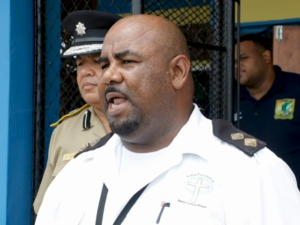
Michael Gladden
Michael Gladden, Chief of Security, Belize Central Prison
“Full black is not allowed. Any excessive jewellery is not allowed. Right now, I will ask you if you have any money in your pocket, you need to remove it. If you have any electronic devices, you need to move it. Why I’m telling you this is because when you enter to my prison, you will be searched. Everybody here will be searched.”
Marion Ali, Reporting
The first phase of the visit that the forty high school students experienced was an introduction by chief of the prison’s security, Michael Gladden. He advised the youths on the do’s and don’ts when visiting the facility. After the students were searched, they were escorted by prison guards and police officers to the sections of the facility that were prepared for their visit. The tour was an initiative undertaken by Assistant Commissioner of Police, Howell Gillett, who also heads the Community Policing Unit. He told News Five that the visit aims to discourage the youths from engaging in a life of crime.
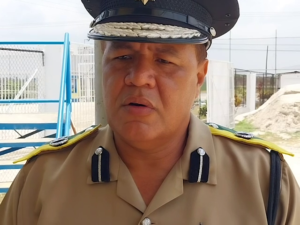
A.C.P Howell Gillett
A.C.P Howell Gillett, Commander, National Community-oriented Policing
“We strategically pick kids from different areas across the city to come and see the end state – what occurs when a crime is committed in the streets. We do so because we are fully aware that some of the behaviours, the actions that brought these inmates here, there are corresponding behaviours withing the communities that these children come from. So, we want them to see not just what they are seeing everyday on a frequent basis, but what the result would be like if we choose that kind of life. We want them to make better decisions for themselves. We want them to see the justice system because the prison is a part of the justice system.”
Virgilio Murillo is the Chief Executive Officer of Kolbe Foundation, which manages the Belize Central Prison. He said that when Gillett contacted him a month ago with the request to have the students visit, he gladly accepted, in the hopes that it is going to deter them from ending up at the facility, not as guests but as inmates.
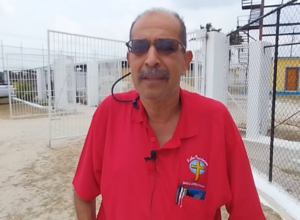
Virgilio Murillo
Virgilio Murillo, C.E.O, Kolbe Foundation
“We’re going to have a few prisoners who will be sharing their personal life stories of what it’s like being in prison because some people have the idea that prison is a bed of roses, but it is not, and it should not be either. The prison is the last option available to the courts to manage those persons who have failed alternative punishments. When the judge or the magistrate sends a person to the prison, obviously there was no other way to control that person or steer that person away from a life of crime, so they had to send them to the prison. My job as the superintendent is to ensure that we rehabilitate them properly, we discipline them properly, so that they do not want to come back.”
Murillo had candid advice for the youths upon their arrival.
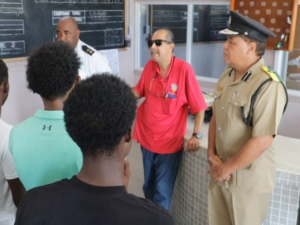
Virgilio Murillo
“My message to them is: stay away from the prison. Crime does not pay. I told them a while ago in there that the only next place that they will end up is burial ground – six feet under. It is as blunt as that.”
The youths were deliberately selected from schools in some of Belize City’s crime-ridden zones. A.C.P Gillett says he believes that that reality does not mean that the youths who come from these areas will be criminals.
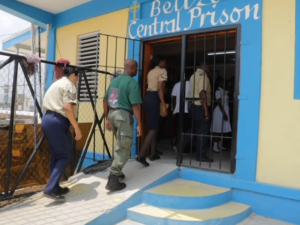 A.C.P Howell Gillett
A.C.P Howell Gillett
“We at the Community Policing Unit know some of the issues that are affecting our communities that we police so the children were chosen from different schools that come from the areas that we want to bring this message that you could live a crime-free life, but it’s a choice that you have to make.”
And for Gillett, the sky is the limit.

A.C.P Howell Gillett
“With the possibility of them choosing a career path in law enforcement, in becoming a social worker, a judge or a magistrate, any part of the system itself.”
Gillett says that a study that has been done on the Community Policing Unit’s engagement with youths over the past decade shows that the unit has interacted with eighty thousand youths over that period and that a large percentage of those youths have gone on to not commit any egregious breach of the law. Marion Ali for News Five.





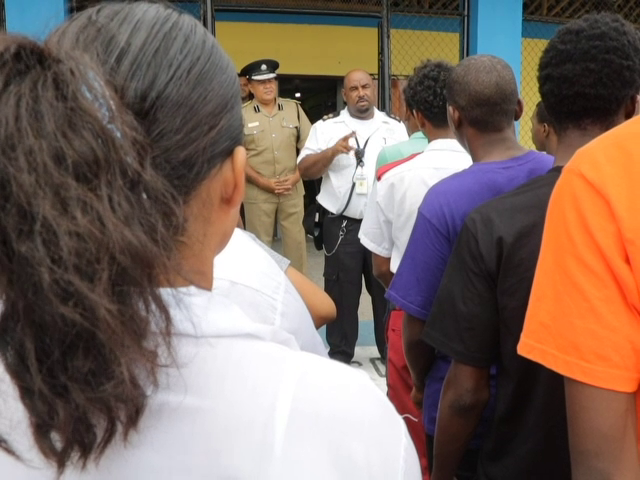

Facebook Comments